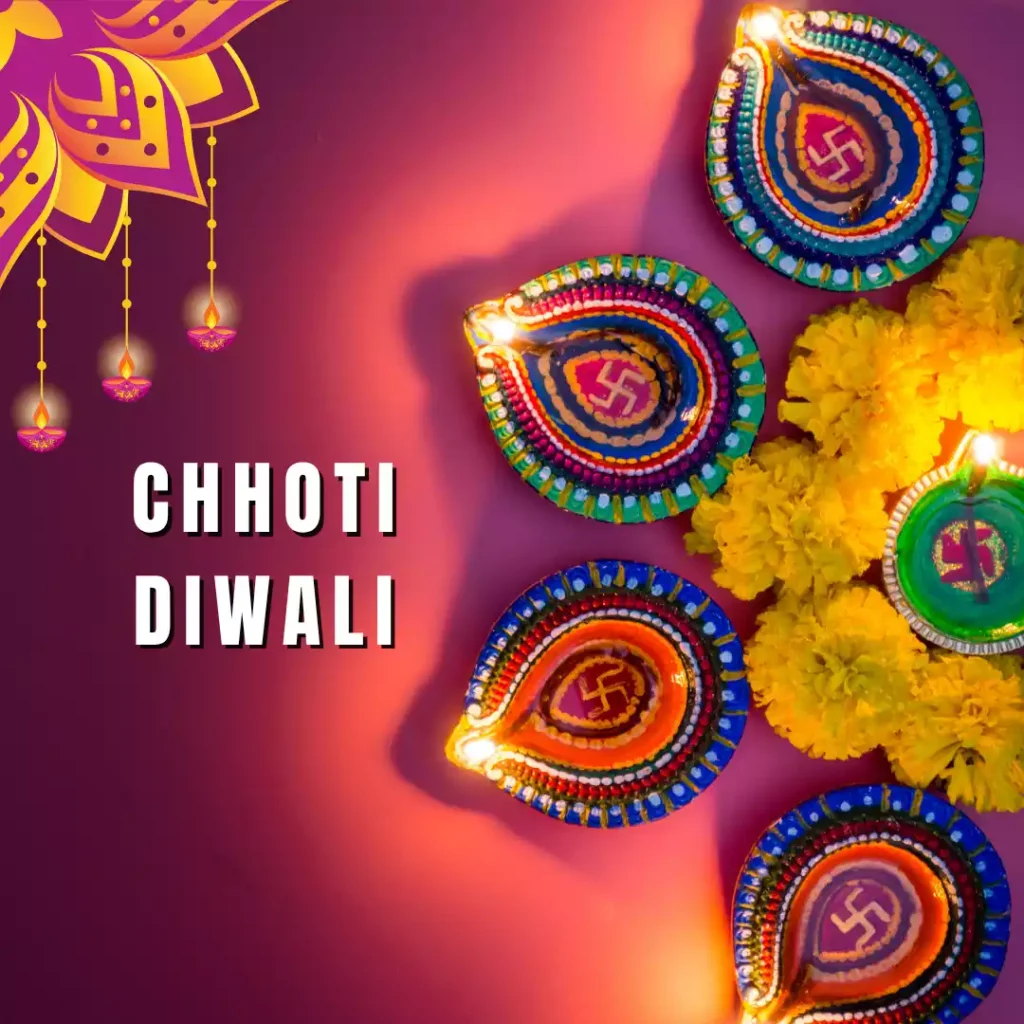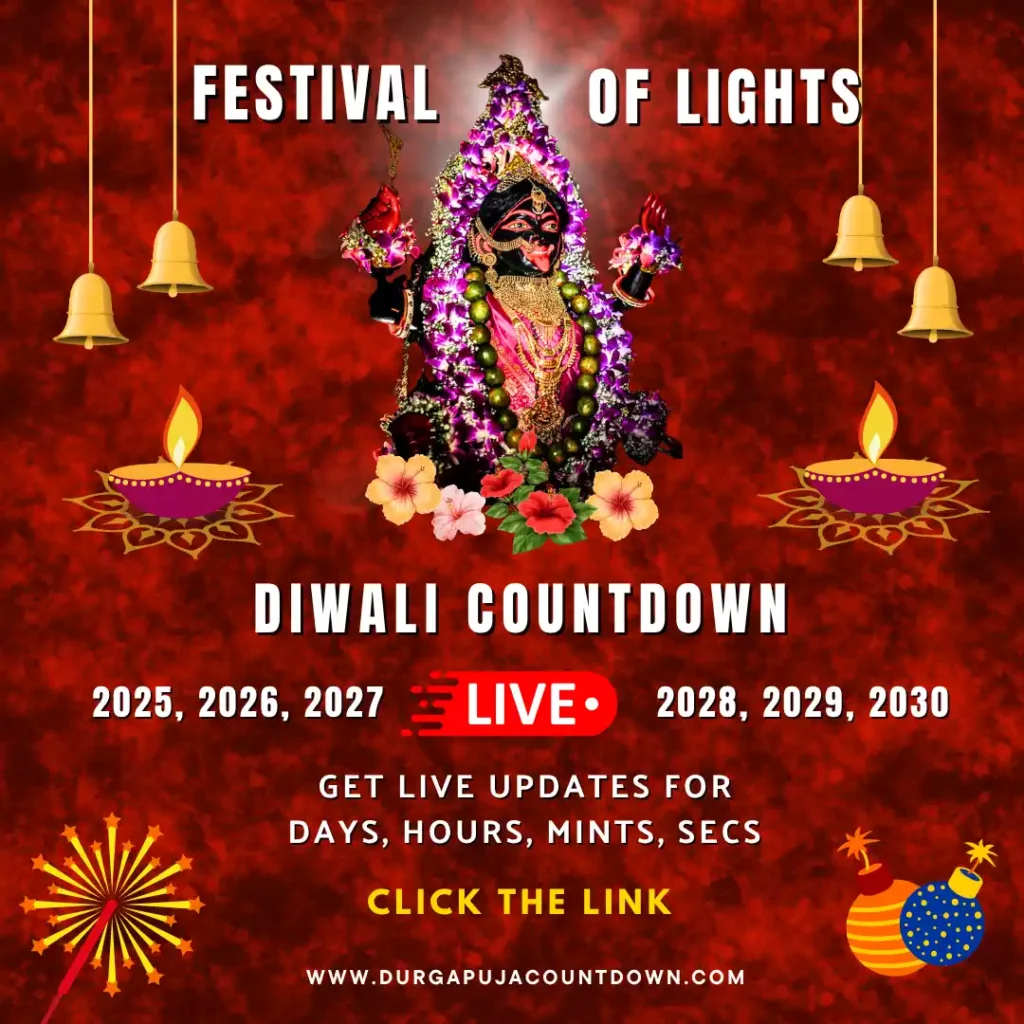Narak Chaturdashi, also known as Chhoti Diwali, is celebrated one day before the main Diwali festival.
It marks Lord Krishna’s victory over the demon Narakasura and sets the stage for the Diwali celebrations.
The festival of Chhoti Diwali will be celebrated on the Chaturdashi of Krishna Paksha in the month of Kartik. This day is also known as Narak Chaudas, Roop Chaudas, and Kali Chaudas. According to belief, Lord Krishna killed the demon Narakasura on this day.
People light a lamp in the name of Lord Yama to seek freedom from untimely death. Worship of Lord Hanuman also holds special significance on this day.
 Join Now
Join Now
Narak Chaturdashi 2025 Date & Timing
Narak Chaturdashi 2025 falls on Sunday, 19th October, 2025.
Chaturdashi Tithi
The Chaturdashi tithi begins on 19th October and ends on 20th October.
- According to the Panchang (Hindu calendar), the Narak Chaturdashi tithi will begin at 1:51 PM on 19th October, 2025 (Sunday) and will end at 3:44 PM on 20th October, 2025 (Monday).
- The auspicious time for Abhyang Snan (ritual oil bath) will be from 4:56 AM to 6:08 AM on this day.
- The favorable time for Deepdan (lamp offering) will be from 11:41 PM on 19th October to 12:31 AM at midnight.
Important Dates and Timings for Narak Chaturdashi 2025
| Event / Ritual | Date | Day | Time / Duration |
|---|---|---|---|
| Narak Chaturdashi (Chhoti Diwali) | 19 October 2025 | Sunday | — |
| Tithi Begins | 19 October 2025 | Sunday | 1:51 PM |
| Tithi Ends | 20 October 2025 | Monday | 3:44 PM |
| Abhyang Snan Muhurat | 20 October 2025 | Monday | 4:56 AM – 6:08 AM |
| Deepdan Muhurat | 19 October 2025 | Sunday Night | 11:41 PM – 12:31 AM |
Story Behind Narak Chaturdashi
The festival is linked to a well-known legend involving Lord Krishna, Satyabhama, Goddess Kali, and the demon Narakasura.
The Legend in Short:
- Narakasura was a powerful demon who terrorized gods and people. He captured many virgins (often given the number 16,000) and held them captive.
- He had a boon that made him almost invincible.
- The gods, tormented by Narakasura’s tyranny, pleaded with Lord Krishna for help.
- Krishna, along with his consort Satyabhama (often considered an incarnation of Bhumi / Earth) and at times goddess Kali, attacked Narakasura’s fortress and ultimately killed him.
- After defeating Narakasura, it is said that Krishna took an early morning ritual oil bath (Abhyang Snan) during Brahma Muhurta (pre-dawn hours) and then liberated the captive women.
- Because of this myth, the day is symbolic of destroying inner demons (such as ignorance, ego, sin) and emerging purified and enlightened.
- Thus, Narak Chaturdashi is celebrated as a victory of good over evil, a cleansing of negativity, and a spiritual renewal.
Narak Chaturdashi Rituals
Here are common rituals and customs observed on Narak Chaturdashi. Practices can vary by region, family tradition, and local custom.
| Time / Occasion | Ritual / Practice | Purpose or Meaning |
|---|---|---|
| Early pre-dawn (Brahma Muhurta / before sunrise) | Abhyang Snan (oil bath) — using scented oils, sometimes mixed with herbs, sandalwood, turmeric, etc. | To purify the body, wash away sins & negativity, and prepare for auspiciousness. |
| After bath | Wear clean new or fresh clothes, perform puja (worship) | To present oneself in purified state before deities |
| Lighting lamps / diyas | In the evening (Pradosh Kaal) people light lamps in the house, especially 4-wick lamps or lamps at entrances | To dispel darkness (evil) and invite positivity. Some scriptures mention lighting a “four-faced, four-wick lamp” in Chaturdashi time. |
| Puja & prayers | Worship Krishna, Satyabhama, and sometimes Kali; recite mantras or slokas; offer flowers, incense, sweets | To express gratitude for protection, request blessings, and renew devotion |
| Special observances | In some places, people pray to Yama (the god of death) seeking protection from untimely death | In some traditions, Yama Deep is lit. |
| Charity & feeding | Sharing food, giving to the needy | A way of expressing compassion and removing darkness (ignorance, selfishness) |
| Fasting / dietary purity | Some people eat simple food (without onion and garlic), avoid non-vegetarian food, avoid negativity | To maintain purity of mind and body |
Chhoti Diwali 2025 Puja Vidhi

1. On the day of Chhoti Diwali, one should apply sesame oil and take a bath at sunrise. Doing so is believed to bring the blessings of Lord Krishna.
2. On this day, devotees worship both Lord Hanuman and Lord Yama (the God of Death).
3. After taking a bath in the morning, spread a red cloth on a wooden platform (chowki). Then, place an idol of Lord Hanuman on it.
4. Recite the Hanuman Chalisa and offer halwa (a sweet dish) to the Lord as prasad.
5. After that, perform the puja (worship) of Lord Krishna and do the aarti.
6. At night, light a lamp (diya) facing the south direction outside your home in the name of Lord Yama.
Narak Chaturdashi Significance & Meanings
Narak Chaturdashi has multiple levels of significance — mythological, symbolic, spiritual, and practical.
Victory of righteousness over evil
The myth of Krishna defeating Narakasura reminds devotees that truth, virtue, and dharma ultimately triumph over cruelty, sin, and darkness.
Purification & spiritual renewal
The ritual bath (Abhyang Snan) is symbolic of cleansing both body and mind. It gives a chance to shed negative tendencies and start anew.
Inner transformation
The festival encourages introspection: what inner “demons” or bad habits can we conquer? It is not merely an external ritual, but a reminder to keep improving oneself.
Invoking protection and auspiciousness
Lighting lamps, praying to Yama, and performing pujas are ways to protect oneself from misfortune, ensure longevity, and attract positive energy.
Cultural & social bonding
Like most Hindu festivals, Narak Chaturdashi is a time when families come together, share meals, exchange greetings, clean and decorate the homes, and renew social ties.
Preparation for the main Diwali celebrations
Since it occurs just before the main Diwali day, Narak Chaturdashi works as a spiritual and ritual cleansing, so devotees can enter the main festival (Lakshmi Puja) with purity and devotion.
Pro Tips to Remember
- Check a reliable local panchang for your city to know exact muhurat and tithi timings.
- Do the Abhyang Snan (oil bath) in the early morning, before sunrise, while tithi is still valid, if possible.
- Use clean clothes and maintain purity in body and mind.
- Light lamps (diyas) in the evening to symbolize dispelling darkness.
- Recite prayers sincerely; if you know the slokas or mantras, use them, or simply pray with devotion.
- Share your joy – charity, feeding others, and acts of kindness enhance the spiritual benefit.
Kali Puja Live Countdown

Read More:
- Visiting These 5 Powerful Kali Temples in India
- Top 10 Diwali Hacks Nobody Told You
- Why Lighting Diyas is More Than Just a Ritual
- Top 7 Powerful Mantras to Chant on Diwali for Prosperity
- Top 20+ Rangoli Design for Diwali

